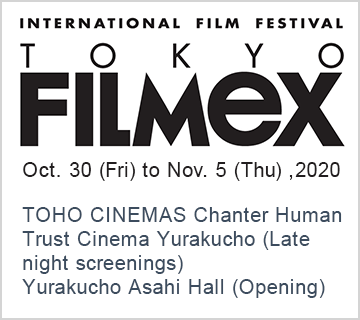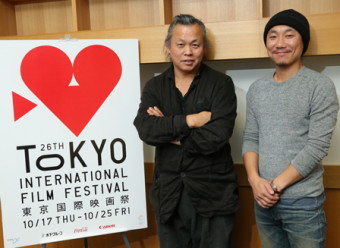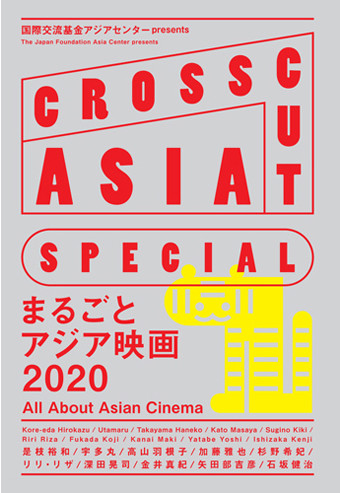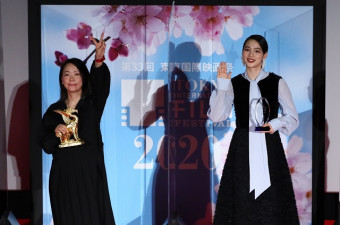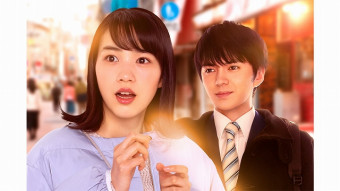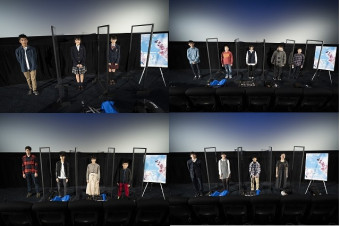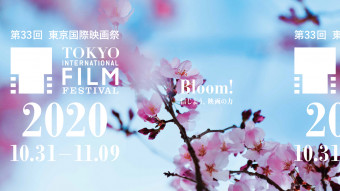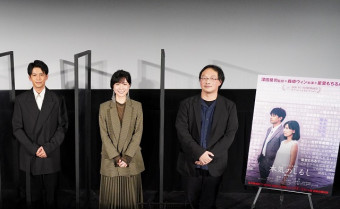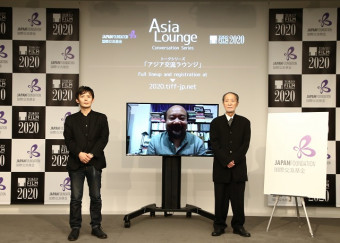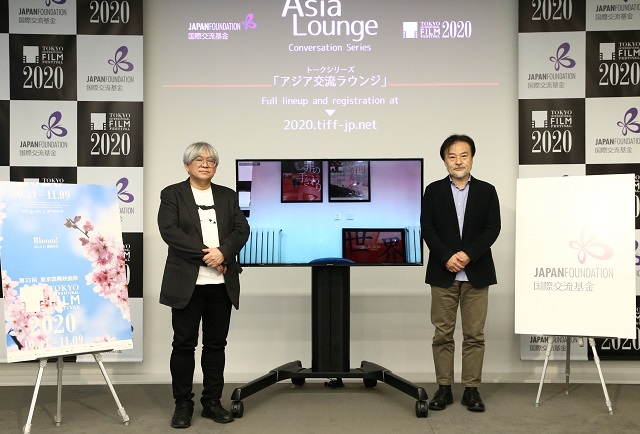
The popular new “Asia Lounge” Conversation Series continued for the seventh day on November 7, but the planned matchup of two of the world’s most celebrated and prolific filmmakers, China’s Jia Zhang-ke and Japan’s Kiyoshi Kurosawa, was not possible since Jia is still recovering from a bad cold.
However, because moderator Shozo Ichiyama is Jia’s longtime producer, and Kurosawa has watched most of Jia’s films, their dialogue about the Chinese auteur was nevertheless spirited.
The series, being co-presented by The Japan Foundation Asia Center and TIFF nightly through November 8, was proposed and co-organized by Cannes Palme d’Or winner Hirokazu Kore-eda to give leading Asian film directors and their Japanese peers a chance to meet and chat about their work. It had to move online in this inaugural year due to Covid, but audiences around the world are able to attend via a TIFF Webinar link and to participate in the Q&A session.
Ichiyama invited Kurosawa to ask him questions in Jia’s stead, and vowed to do his best responding. “I’ve had the pleasure of meeting Mr. Jia at various film festivals and I had prepared some questions to ask him today,” said the director of such global hits as Cure, Bright Future and Tokyo Sonata. “So while I’m concerned about his health, and hope that Mr. Jia will recover soon, I’m relieved that I don’t have to [toss my questions].
“I’ve had a lot of opportunities recently to watch the latest Chinese films, and my impression is that the level of quality has improved so much, it’s really impressive. I feel strongly that the filmmakers choose the perfect locations to shoot their stories. These locations are neither old nor new, but rather in areas that are under development. The films are so lively and entertaining, even when they’re shooting in such areas.
“But this kind of location seems to be a consistent choice, including for Mr. Jia. Does he first choose the location and then start developing his films? I’m often surprised at the angle from which he’s capturing his shots.”
Responded Ichiyama, “As you point out, location is a very important element in developing his scripts. Even in the first draft, Jia has already chosen his location. Let me share an example, with Still Life. He was going to film a documentary about a village that was going to be immersed due to damn construction, but he was inspired by the area, by the workers who came from the provinces [to build the damn]. With his wife Zhao Tao and his cousin, he had people readily available to appear, and he shot the documentary in parallel to making the fiction feature.”
Kurosawa had reason to be envious. “I think that is ideal for the filmmaker, since I can’t just find locations in the city and try to shoot here — we’d never be able to get approval. For the types of films that I make, it’s just really difficult to do that. Is it easy for Mr. Jia?”
“In major cities like Beijing or Shanghai,” explained Ichiyama, “there are a lot of regulations, so you need to get approval or the authorities will stop you. But in the rural areas like you see in Jia’s films, it’s much easier. He shoots a lot of his films in Shanxi Province, where he’s from, where he has a lot of friends and family. The authorities are very cooperative and happy to help, because he’s a filmmaker from their province.”
Said Kurosawa, “When you look at his films, if you’re going back in time to the 1980s, for example, going back through decades, is it easy to find locations still existing? In Japan, it’s difficult.”
Ichiyama responded, “Mountains May Depart and Ash Is the Purest White both span 20-year periods, and Mountains has a bit of a futuristic aspect, too. He had a little difficulty with the different decades. But because you’re outside the major cities, life in those areas hasn’t really changed much. Old shopping arcades and outdoor toilets in the fields still exist, and the art department didn’t have to recreate much except for electrical appliances. In Mountains, there’s a scene in a disco, and there was one that had gone bankrupt and was sitting there empty. In Japan, such a large space wouldn’t be left like that, but it was still there, so Jia’s art department only have to do a little fixing up to use it in the film.”
Kurosawa asked whether the Chinese auteur prefers to use sets from the not-so-distant past rather than modern-day sets; whether he has a preference for stories that span several decades. Said Ichiyama, “He has a little over 20 years of experience, starting with Xiao Wu in 1998 and Platform in 2000, and there was a significant transformation going on in China during that time, even in the rural areas. China has become really wealthy, but it’s lost something that it had. So the younger generation in the early 2000s may not believe that this is the ideal China.
“It took him a year to get approval for Platform and in the end it was banned, so he had to go underground. But during that time, he and his cinematographer started shooting a lot of footage of old buildings and places. When you see Mountains May Depart, you’ll see some of that footage.
“In the Mountains script, there was a lot of detail about this middle-aged man dancing wildly, and I asked him why he was emphasizing that so much. He responded that he’d shot the footage of him already. So I think he was using the footage in his archives as a way to develop his scripts.”
Kurosawa noted that Ash is the Purest White has “a melodramatic structure — a couple meets and then they break up — almost like a genre film. This type of structure is also there in A Touch of Sin. Was there a trigger that made him adopt this type of structure?”
“In terms of genre films,” said Ichiyama, “A Touch of Sin was probably his first (in 2013). At Cannes, a lot of critics asked him why he was making such a violent film, and I think that was his first step in that direction. He’s a huge fan of Hong Kong action and gang films. When you see Xiao Wu, you can hear the same sounds as John Woo’s The Killer. There was a rapport between the two and that’s why you feel that essence in his films. Obviously, he was heavily influenced by the action and violence in John Woo’s 1980’s films.”
Kurosawa commented, “When you focus on people living in areas that are undergoing development, and you also show genre violence, you’re talking about two different forms of expression. Is it easy for him to combine the two?”
“That’s an interesting question,” said Ichiyama. “For example, he had an action director come from Hong Kong to help direct the rifle scene in A Touch of Sin. It was quite different from the types of realistic scenes he usually directs.”
Noted Kurosawa, “China’s producing a lot of action films. Do you know if he’s planning to direct one, or if he has any aspiration to make a film in Hollywood, for example?”
Ichiyama responded, “It’s been officially announced in the Chinese media that he was planning to make a film, I think it was to be called Incident in Xingdao, set during the Boxer Rebellion, a story about the younger generation fighting against the Western powers coming into the country. He had a plan to make a type of martial arts action film, and he had the location and the script was being developed. Johnnie To said the financing would be through Hong Kong. But it didn’t happen. Perhaps it’s still happening.”
Recalled Kurosawa, “I just remembered this episode when I was at the Hong Kong International Film Festival, chatting with Mr. Jia, and we heard that Johnnie To was having a party and we were invited. So we went along. It was the first time I’d met him, but he greeted us both with a big hug and made us feel like peers.”
A viewer asked which Jia film had made the strongest impression on Kurosawa. He said, “Xiao Wu left a strong impression on me. And so did Platform. There’s a scene where young actors are preparing for a theater piece and you hear the music from Genghis Khan (a rock opera) and I’ve come to like it very much.”
Asked if he had any plans to make a documentary himself someday, as Jia often does, Kurosawa said, “Honestly, I’ve never shot a documentary, and I have no idea how difficult or interesting the experience would be. You might think I’m closing the door to a possibility, but from my youth I’ve always been interested in fiction stories and that’s how I wound up in this world. I had an 8mm camera, and when I was young, I used to shoot all sorts of things, which is a form of documentary. But I didn’t like it.
“I want to be able to control what I see in front of me. I want to have actors act the way I envision the roles to be. I want to shoot an empty city, or shoot things that I have intentionally created. With documentary, there’s no control.”
What about shooting a film in China? “Of course I’ve been to China several times, mostly as a tourist. As we see in Mr. Jia’s films, there are older buildings right next to ultramodern buildings, and as a filmmaker I think it would probably be really interesting to capture that. At the moment, though, I don’t really have any ideas. But when we think of the very long history that exists between Japan and China, I would like to make a film about that relationship. I actually started making a film, 1905, about that, but it was not completed.”
Prompted to choose any location anywhere, Kurosawa admitted, “If there was a possibility, I would love to make a film in Shibuya (Tokyo). It’s currently undergoing a huge reformation, they’ve destroyed a lot of the older buildings and built huge new buildings, and it’s hard to imagine what it’s going to look like in the future. But it would be very difficult to get permission to shoot, so I try not to want it too badly.”
Kurosawa’s Wife of a Spy, for which he recently won the Silver Lion Best Director Award at the Venice International Film Festival, is currently on release in Japan. An overseas viewer asked how Japanese had reacted to the win, and whether there was any discussion about his depiction of Japan’s notorious Unit 731 in China during the war.
He responded, “It was covered quite a lot in Japan, and I’m grateful for the award. The day after I got the award, the top news was about Mr. Suga becoming prime minister, the next story was about Naomi Osaka, and news of my award was third, which really surprised me. There was no pushback against the story. The film wasn’t made for propaganda purposes. I wasn’t trying to send a message about something that has never been exposed, it’s a genre film. I think everyone is well aware of [Unit 731] and I didn’t have any pushback whatsoever.”
Another overseas viewer asked whether Kurosawa’s international acclaim made it any easier for him to raise financing at home. Explaining that he wasn’t involved in the financing process at all, he said, “There are various types of producers, but just because your films are popular overseas doesn’t seem to be a huge benefit. It could be that the producers hope the film will be invited to a festival and do well abroad, providing an opportunity to them as well. And I appreciate working with that type of producer.”
In conclusion, the Japanese press wanted to know what he thought about the “Asia Lounge,” now that he’d participated. Kurosawa replied, “Filmex and TIFF both provide platforms for showing unknown Asian talents. But I think maybe we’re narrowing it down too much by focusing only on Asia. If Mr. Jia had been with us today, I would’ve wanted to go beyond Asia and ask him what he thought about recent American and French films and filmmakers.”






